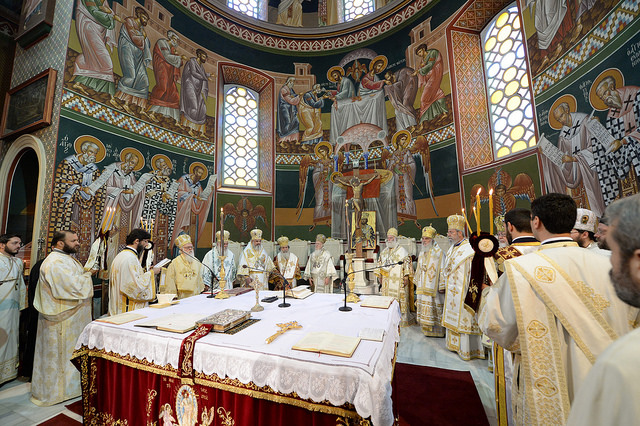
Orthodoxy at the Crossroads:
What to Expect After the Holy and Great Council
Thursday, Nov. 17, 2016
Loyola Marymount University
2016 witnessed an epic event in the Orthodox Church. In June, ten of the world’s fourteen autocephalous Orthodox Churches gathered for the Holy and Great Council in Crete and issued documents on marriage, fasting, and relations with the world and non-Orthodox Churches, among other teachings. Controversy and intrigue surrounded the Council, especially its final statement on the status of non-Orthodox Churches: are Catholics, Episcopalians, and Lutherans Christians or heretics? Are they Churches, or schismatic communities? How should Orthodox people relate to other Christians, and what is their responsibility in the world? Bishop Maxim (Vasilijevic) of the Western American Diocese of the Serbian Orthodox Church in North and South America, V. Rev. John Behr, Dean of St. Vladimir’s Orthodox Theological Seminary in New York, and V. Rev. Archimandrite Cyril Hovorun, Postdoctoral Teaching Fellow of the Huffington Ecumenical Institute, will talk about the Church’s responsibility in interpreting and receiving the teachings of the Council in Crete.
Lecture:
His Grace Bishop Maxim (Vasiljevic)
V. Rev. John Behr
Response:
Archimandrite Cyril Hovorun
About the Speakers:
His Grace Bishop Maxim (Vasiljevic) was elected Bishop of the Western American Diocese of the Serbian Orthodox Church in North and South American at the regular assembly of the Hierarchs of the Serbian Orthodox Church in Belgrade, Serbia in 2006. Bishop Maxim is a professor of Patristics at the Theological Faculty of the University of Belgrade, and was teaching Christian Anthropology and Sociology at the University of East Sarajevo and Patrology at the St. Sava School of Theology in Libertyville, Illinois. His Grace Bishop Maxim graduated from the Faculty of Orthodox Theology, University of Belgrade, in 1993. He completed his Masters of Theology at the University of Athens in 1996, and then three years later, in 1999, at the same university, he defended his doctorate in the field of Dogmatics and Patristics. He worked for one year on his post-doctorate in Paris and the Sorbonne in 2003-04, in the field of Byzantine History and Hagiography. During this time, he also delved in the theory and practical application of painting at the French Academy of Fine Arts in Paris. Bishop Maxim speaks Greek, French, Russian and English. He was the editor of “Theology” – Journal of the Faculty of Orthodox Theology, University of Belgrade. He also leads the Diocesan iconographical school inspired by Byzantine and Serbian medieval fresco painting and by Fr. Stamatis Skliris. Bishop Maxim’s scholarly books, studies , and articles include essays on Holy Fathers and Saints; he has also written on the hagiographical and iconographical themes.
V Rev. John Behr is the Dean of St Vladimir’s Orthodox Theological Seminary and Professor of Patristics. His early work was on asceticism and anthropology, focusing on St Irenaeus of Lyons and Clement of Alexandria (OUP 2000). He is writing a series of books on “The Formation of Christian Theology”, two volumes of which have already appeared: vol. 1, The Way to Nicaea (SVS Press 2001) and vol. 2 The Nicene Faith (SVS Press 2003). On the basis of these two volumes, he published a synthetic work, The Mystery of Christ: Life in Death (SVS 2006). This was followed by an edition and translation of the fragments of Diodore of Tarsus and Theodore of Mopsuestia, setting them in their historical and theological context (OUP 2011). More recently Fr John published a more poetic and meditative work entitled Becoming Human: Theological Anthropology in Word and Image (SVS Press, 2013) and a full study of St Irenaeus: St Irenaeus of Lyons: Identifying Christianity (OUP, 2013). Most recently he has completed a new critical edition and translation of Origen’s On First Principles, together with an extensive introduction, for OUP (forthcoming Dec. 2017). He is currently working on a new edition and translation of the works of Irenaeus and a book on the Gospel of St John.
Archimandrite Cyril Hovorun is a postdoctoral research fellow at Loyola Marymount University. At LMU, he is on academic leave from Sankt Ignatius Theological Academy in Sweden and the Stockholm School of Theology, where he is a Senior lecturer. His main fields of expertise are early Christian traditions, ecclesiology, and public theology. He has published Will, Action and Freedom: Christological Controversies in the Seventh Century (Leiden; Boston: Brill, 2008) and Meta-Ecclesiology: Chronicles on Church Awareness (New York: Palgrave Macmillan, 2015). Fr Cyril chaired the Department of External relations of the Ukrainian Orthodox Church. He also bore responsibilities for the modernization of the system of theological education in the Russian Orthodox Church, when he was the first deputy chairman of the Educational Committee of the Moscow Patriarchate. He has been engaged in numerous ecumenical activities, as a member of the Commission on Faith and Order of the World Council of Churches, and as an Orthodox representative to the bilateral dialogues with the Roman Catholic, Anglican, Lutheran and Oriental churches, as well as to the Orthodox-Jewish dialogue.